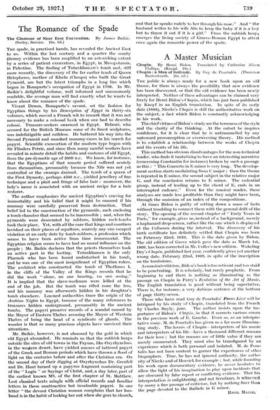A Master Musician
THE public is always ready for a new book upon an old theme, for there is always the possibility that new evidence has been discovered, or that the old evidence has been newly interpreted. Neither of these advantages can be claimed very freely for Henri. Bidou's Chopin, which has just been published by Knopf in an English translation. In spite of its early date (1888), Niecks Chopin is still the authoritative work on the subject; a fact which Bidou is constantly acknowledging in his work.- The chief virtues of Bidou's study are the terseness of the style
. _ .
and the clarity of . the thinking. At the .outset he inspires confidence, for it is clear that he is untrammelled by any untoward preconception or overweening theory. His method .
Is to establish' a relationship between the works of Chopin the and the events of his life.
This Method has obvim-ts disadvantages for the non-technical
_
reader, who finds it tantalizing to have an interesting narrative (concerning Constantin for instance) broken by such a passage as this : " This Concerto in E minor is very long. The develop- ment section starts modulating from C major ; then the theme is repeated in E minor, the second subject in the relative major G, and the conclusion returns to E minor. The cadential group, instead of leading up to the chord of E, ends in an interrupted cadence." Even for the musical reader, these analyses are made less profitable than they might have been, through the omission of an index of the compositions.
At times Bidou is guilty of setting down a mass of facts
without troubling to connect them with the general drift of the story. The opening of the second chapter of " Early Years in Paris," for example, gives us,instead of a background, merely a haphazard drop-screen, rather like the one which is displayed at the Coliseum during the interval. The discovery of his birth certificate has definitely settled that Chopin was born on February 22nd, 1810. This is the date given by Bidou. The old edition of Grove which gave the date as March 1st, 1809, has been corrected in Mr. Colles's new edition. Wakeling Dry's Chopin, published last year, confidently gives yet another wrong date, February 22nd, 1809, in spite of the inscription on the tombstone.
As musical criticisni, Bidou's book is too reticent and too staid
to be penetrating. It is scholarly, but rarely prophetic. From beginning to end there is nothing so illuminating as the passage on Chopin in Parry's Evolution of the Art of Music. The English translation is good without being superlative. There is, for instance, a very dubious sentence at the bottom of page thirty-seven.
Those who have read Guy de Pourtales' Franz Liszt will be intrigued by his study of Chopin, translated from the French by Charles Bayly, junr. The author insists upon the im- portance of Bidou's ClAvin, in that it corrects various errors in the previous work of E. Ganche. Even so, as an interpre- tative essay, M. de Pourtales has given us a far more illumina- ting study..., The lovers of Chopin--interpreters of his music and interpreters of his life—have a thousand different reasons for their love ; but the reasons are of little value if they are Merely enumerated. They must also be transfigured by an experience which is both personal and isolated. M. de Pour- tales has not been content to garner the experiences of other biographers. True, he has not ignored authority, the autho- rity ofNiecks and of Hoesick for example ; but, while founding his work upon documentary evidence, lie never hesitates to allow the light of his imagination to play upon incidents that are obscured by false report or conflicting evidence. That his interpretation is enlightening, and not licentious, is witnessed by many a fine passage of criticism, but by nothing finer than the page devoted to the Ballade in G minor.
BASIL MAINE.


























































 Previous page
Previous page